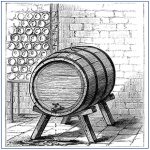Federal Definition Distilled Spirits Alcohol
Distilled spirits, as defined by the federal government, is ethyl alcohol, hydrated oxide of ethyl, spirits of wine, whiskey, rum, brandy, gin, and other distilled spirits, including dilutions and mixtures thereof, for non industrial use. Fortified wines, such as Port, Sherry, and Vermouth, are not considered distilled spirits.
Lindsey A. Zahn, Esq. is an alcohol beverage and food attorney at Lehman Beverage Law, PLLC. Ms. Zahn has previously counseled wine, beer, and spirits companies on licensing and compliance, federal and state labeling, customs regulations, supplier agreements, and advertising and promotions. She is an award-winning author on wine law, publishes a leading wine law blog called On Reserve, and has traveled to over a dozen wine regions in the U.S. and Europe.
John D. Messinger, Esq. is an attorney at Lehrman Beverage Law, PLLC. He joined the firm in 2006 as a law clerk, after working as an intern and consultant with the World Bank, Legal Operations and Policy. John focuses on TTB labeling and formulation matters and also state compliance issues.
John has a particular interest in beer and craft beer issues, and he is an avid small-scale brewer.In this CLE class clip, Lindsey and John discuss the federal definition of distilled spirits.
Distilled Spirits Classifications & Type Designations:
- Vodka
- Whiskey
- Gin
- Rum
- Tequila/Mezcal
- Liqueur/Cordial
- Flavored
- Vodka
- Whiskey
- Gin
- Brandy
- Rum
- Recognized Cocktails
- Imitation Products
- Distilled Spirits Specialty
Neutral Spirits/Vodka – Distilled from any material, to 190+ proof, bottled at not less than 80 proof.
Whiskey – Distilled from fermented mash of 100% grain, to less than 190 proof, stored in oak, bottled at not less than 80 proof.
Brandy – Distilled from fermented juice, mash or wine of fruit, to less than 190 proof, bottled at not less than 80 proof.
Rum – Distilled from fermented sugar cane, to less than 190 proof, bottled at not less than 80 proof.
Tequila – Distilled in Mexico, from a fermented mash derived principally from blue agave, bottled at not less than 80 proof.
Gin – Distilled spirits distilled or mixed with juniper berries, main characteristic flavor derived from juniper berries, bottled at not less than 80 proof.
Liqueur/Cordial – Distilled spirits with natural flavor(s) and not less than 2.5% sugar by weight.
Flavored Vodka, Whiskey, Gin, Brandy, Rum – Specific class of distilled spirits with natural flavor(s), bottled at not less than 60 proof, labeled with predominate flavor.
Recognized Cocktails – Trade/consumer recognized mixed drink made from one or more classes/types of distilled spirits with flavor(s) and/or color(s).
Distilled Spirit Specialty – Distilled spirits not defined under any other class and/or any defined class/type treated with non-traditional ingredients/processes.
Bourbon Whiskey – Whiskey produced in the U.S., from a fermented mash of not less than 53% corn, distilled to not more than 160 proof, stored at not more than 125 proof in charred new oak containers.
Blended Whiskey – Whiskey produced by blending straight whiskey, not less than 2-% on a proof gallon basis, or blended of straight whiskeys, and whiskey of any type and/or neutral spirits.
Scotch Whiskey – Unblended whiskey, produced in Scotland in compliance with the laws of the United Kingdom.
Canadian Whiskey – Unblended whiskey, produced in Canada in compliance with its laws.
Examples of recognized cocktails:
Margarita – Tequila, triple sec, and lime or lemon juice (oil/ or natural flavor)
Daiquiri – Rum and line juice
Bloody Mary – Vodka and tomato juice (oil/ or natural flavor)
Martini – Gin and vermouth
Vodka Martini – Vodka and vermouth
Old Fashioned – Straight bourbon whiskey and bitters
Manhattan – Any type of whiskey and vermouth
Mai Tai – Rum and citrus juices (oil/ or natural flavor)
White Russian – Vodka, coffee flavored brandy/liqueur and cream
Pink Squirrel – Cream de almond, creame de cacao and cream








